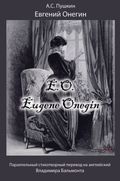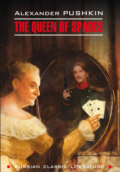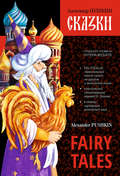полная версия

Александр Пушкин
Boris Godunov
Thither I haste, and there had flocked already
All Uglich. There I see the young tsarevich
Lie slaughtered: the queen mother in a swoon
Bowed over him, his nurse in her despair
Wailing; and then the maddened people drag
The godless, treacherous nurse away. Appears
Suddenly in their midst, wild, pale with rage,
Judas Bityagovsky. "There, there's the villain!"
Shout on all sides the crowd, and in a trice
He was no more. Straightway the people rushed
On the three fleeing murderers; they seized
The hiding miscreants and led them up
To the child's corpse yet warm; when lo! A marvel—
The dead child all at once began to tremble!
"Confess!" the people thundered; and in terror
Beneath the axe the villains did confess—
And named Boris.
GREGORY. How many summers lived
The murdered boy?
PIMEN. Seven summers; he would now
(Since then have passed ten years—nay, more—twelve years)
He would have been of equal age to thee,
And would have reigned; but God deemed otherwise.
This is the lamentable tale wherewith
My chronicle doth end; since then I little
Have dipped in worldly business. Brother Gregory,
Thou hast illumed thy mind by earnest study;
To thee I hand my task. In hours exempt
From the soul's exercise, do thou record,
Not subtly reasoning, all things whereto
Thou shalt in life be witness; war and peace,
The sway of kings, the holy miracles
Of saints, all prophecies and heavenly signs;—
For me 'tis time to rest and quench my lamp.—
But hark! The matin bell. Bless, Lord, Thy servants!
Give me my crutch.
(Exit.)
GREGORY. Boris, Boris, before thee
All tremble; none dares even to remind thee
Of what befell the hapless child; meanwhile
Here in dark cell a hermit doth indite
Thy stern denunciation. Thou wilt not
Escape the judgment even of this world,
As thou wilt not escape the doom of God.
FENCE OF THE MONASTERY2
GREGORY and a Wicked Monk
GREGORY. O, what a weariness is our poor life,
What misery! Day comes, day goes, and ever
Is seen, is heard one thing alone; one sees
Only black cassocks, only hears the bell.
Yawning by day you wander, wander, nothing
To do; you doze; the whole night long till daylight
The poor monk lies awake; and when in sleep
You lose yourself, black dreams disturb the soul;
Glad that they sound the bell, that with a crutch
They rouse you. No, I will not suffer it!
I cannot! Through this fence I'll flee! The world
Is great; my path is on the highways never
Thou'lt hear of me again.
MONK. Truly your life
Is but a sorry one, ye dissolute,
Wicked young monks!
GREGORY. Would that the Khan again
Would come upon us, or Lithuania rise
Once more in insurrection. Good! I would then
Cross swords with them! Or what if the tsarevich
Should suddenly arise from out the grave,
Should cry, "Where are ye, children, faithful servants?
Help me against Boris, against my murderer!
Seize my foe, lead him to me!"
MONK. Enough, my friend,
Of empty babble. We cannot raise the dead.
No, clearly it was fated otherwise
For the tsarevich—But hearken; if you wish
To do a thing, then do it.
GREGORY. What to do?
MONK. If I were young as thou, if these grey hairs
Had not already streaked my beard—Dost take me?
GREGORY. Not I.
MONK. Hearken; our folk are dull of brain,
Easy of faith, and glad to be amazed
By miracles and novelties. The boyars
Remember Godunov as erst he was,
Peer to themselves; and even now the race
Of the old Varyags is loved by all. Thy years
Match those of the tsarevich. If thou hast
Cunning and hardihood—Dost take me now?
GREGORY. I take thee.
MONK. Well, what say'st thou?
GREGORY. 'Tis resolved.
I am Dimitry, I tsarevich!
MONK. Give me
Thy hand, my bold young friend. Thou shalt be tsar!
PALACE OF THE PATRIARCH
PATRIARCH, ABBOT of the Chudov Monastery
PATRIARCH. And he has run away, Father Abbot?
ABBOT. He has run away, holy sovereign, now three days ago.
PATRIARCH. Accursed rascal! What is his origin?
ABBOT. Of the family of the Otrepievs, of the lower nobility
of Galicia; in his youth he took the tonsure, no one
knows where, lived at Suzdal, in the Ephimievsky
monastery, departed from there, wandered to various
convents, finally arrived at my Chudov fraternity;
but I, seeing that he was still young and inexperienced,
entrusted him at the outset to Father Pimen, an old man,
kind and humble. And he was very learned, read our
chronicle, composed canons for the holy brethren; but,
to be sure, instruction was not given to him from the
Lord God—
PATRIARCH. Ah, those learned fellows! What a thing to
say, "I shall be tsar in Moscow." Ah, he is a vessel of
the devil! However, it is no use even to report to the
tsar about this; why disquiet our father sovereign?
It will be enough to give information about his flight to
the Secretary Smirnov or the Secretary Ephimiev.
What a heresy: "I shall be tsar in Moscow!"…
Catch, catch the fawning villain, and send him to
Solovetsky to perpetual penance. But this—is it not
heresy, Father Abbot?
ABBOT. Heresy, holy Patriarch; downright heresy.
PALACE OF THE TSAR
Two Attendants
1ST ATTENDANT. Where is the sovereign?
2ND ATTENDANT. In his bed-chamber,
Where he is closeted with some magician.
1ST ATTENDANT. Ay; that's the kind of intercourse he loves;
Sorcerers, fortune-tellers, necromancers.
Ever he seeks to dip into the future,
Just like some pretty girl. Fain would I know
What 'tis he would foretell.
2ND ATTENDANT. Well, here he comes.
Will it please you question him?
1ST ATTENDANT. How grim he looks!
(Exeunt.)
TSAR. (Enters.) I have attained the highest power. Six years
Already have I reigned in peace; but joy
Dwells not within my soul. Even so in youth
We greedily desire the joys of love,
But only quell the hunger of the heart
With momentary possession. We grow cold,
Grow weary and oppressed! In vain the wizards
Promise me length of days, days of dominion
Immune from treachery—not power, not life
Gladden me; I forebode the wrath of Heaven
And woe. For me no happiness. I thought
To satisfy my people in contentment,
In glory, gain their love by generous gifts,
But I have put away that empty hope;
The power that lives is hateful to the mob,—
Only the dead they love. We are but fools
When our heart vibrates to the people's groans
And passionate wailing. Lately on our land
God sent a famine; perishing in torments
The people uttered moan. The granaries
I made them free of, scattered gold among them,
Found labour for them; furious for my pains
They cursed me! Next, a fire consumed their homes;
I built for them new dwellings; then forsooth
They blamed me for the fire! Such is the mob,
Such is its judgment! Seek its love, indeed!
I thought within my family to find
Solace; I thought to make my daughter happy
By wedlock. Like a tempest Death took off
Her bridegroom—and at once a stealthy rumour
Pronounced me guilty of my daughter's grief—
Me, me, the hapless father! Whoso dies,
I am the secret murderer of all;
I hastened Feodor's end, 'twas I that poisoned
My sister-queen, the lowly nun—all I!
Ah! Now I feel it; naught can give us peace
Mid worldly cares, nothing save only conscience!
Healthy she triumphs over wickedness,
Over dark slander; but if in her be found
A single casual stain, then misery.
With what a deadly sore my soul doth smart;
My heart, with venom filled, doth like a hammer
Beat in mine ears reproach; all things revolt me,
And my head whirls, and in my eyes are children
Dripping with blood; and gladly would I flee,
But nowhere can find refuge—horrible!
Pitiful he whose conscience is unclean!
TAVERN ON THE LITHUANIAN FRONTIER
MISSAIL and VARLAAM, wandering friars; GREGORY in secular attire; HOSTESS
HOSTESS. With what shall I regale you, my reverend
honoured guests?
VARLAAM. With what God sends, little hostess. Have you
no wine?
HOSTESS. As if I had not, my fathers! I will bring it at
once. (Exit.)
MISSAIL. Why so glum, comrade? Here is that very
Lithuanian frontier which you so wished to reach.
GREGORY. Until I shall be in Lithuania, till then I shall not
Be content.
VARLAAM. What is it that makes you so fond of Lithuania!
Here are we, Father Missail and I, a sinner, when we fled
from the monastery, then we cared for nothing. Was it
Lithuania, was it Russia, was it fiddle, was it dulcimer?
All the same for us, if only there was wine. That's the
main thing!
MISSAIL. Well said, Father Varlaam.
HOSTESS. (Enters.)
There you are, my fathers. Drink to your health.
MISSAIL. Thanks, my good friend. God bless thee. (The
monks drink. Varlaam trolls a ditty: "Thou passest
by, my dear," etc.) (To GREGORY) Why don't you join
in the song? Not even join in the song?
GREGORY. I don't wish to.
MISSAIL. Everyone to his liking—
VARLAAM. But a tipsy man's in Heaven.3 Father Missail!
We will drink a glass to our hostess. (Sings: "Where
the brave lad in durance," etc.) Still, Father Missail,
when I am drinking, then I don't like sober men; tipsiness
is one thing—but pride quite another. If you want
to live as we do, you are welcome. No?—then take
yourself off, away with you; a mountebank is no
companion for a priest.
GREGORY. Drink, and keep your thoughts to yourself,4
Father Varlaam! You see, I too sometimes know how
to make puns.
VARLAAM. But why should I keep my thoughts to myself?
MISSAIL. Let him alone, Father Varlaam.
VARLAAM. But what sort of a fasting man is he? Of his
own accord he attached himself as a companion to us;
no one knows who he is, no one knows whence he comes—
and yet he gives himself grand airs; perhaps he has a
close acquaintance with the pillory. (Drinks and sings:
"A young monk took the tonsure," etc.)
GREGORY. (To HOSTESS.) Whither leads this road?
HOSTESS. To Lithuania, my dear, to the Luyov mountains.
GREGORY. And is it far to the Luyov mountains?
HOSTESS. Not far; you might get there by evening, but for
the tsar's frontier barriers, and the captains of the
guard.
GREGORY. What say you? Barriers! What means this?
HOSTESS. Someone has escaped from Moscow, and orders
have been given to detain and search everyone.
GREGORY. (Aside.) Here's a pretty mess!
VARLAAM. Hallo, comrade! You've been making up to
mine hostess. To be sure you don't want vodka, but
you want a young woman. All right, brother, all right!
Everyone has his own ways, and Father Missail and I
have only one thing which we care for—we drink to the
bottom, we drink; turn it upside down, and knock at
the bottom.
MISSAIL. Well said, Father Varlaam.
GREGORY. (To Hostess.) Whom do they want? Who
escaped from Moscow?
HOSTESS. God knows; a thief perhaps, a robber. But here
even good folk are worried now. And what will come of
it? Nothing. They will not catch the old devil; as if
there were no other road into Lithuania than the highway!
Just turn to the left from here, then by the pinewood
or by the footpath as far as the chapel on the
Chekansky brook, and then straight across the marsh to
Khlopin, and thence to Zakhariev, and then any child
will guide you to the Luyov mountains. The only good
of these inspectors is to worry passers-by and rob us poor
folk. (A noise is heard.) What's that? Ah, there
they are, curse them! They are going their rounds.
GREGORY. Hostess! Is there another room in the cottage?
HOSTESS. No, my dear; I should be glad myself to hide.
But they are only pretending to go their rounds; but
give them wine and bread, and Heaven knows what—
May perdition take them, the accursed ones! May—
(Enter OFFICERS.)
OFFICERS. Good health to you, mine hostess!
HOSTESS. You are kindly welcome, dear guests.
AN OFFICER. (To another.) Ha, there's drinking going on
here; we shall get something here. (To the Monks.)
Who are you?
VARLAAM. We—are two old clerics, humble monks; we are
going from village to village, and collecting Christian
alms for the monastery.
OFFICER. (To GREGORY.) And thou?
MISSAIL. Our comrade.
GREGORY. A layman from the suburb; I have conducted the
old men as far as the frontier; from here I am going to
my own home.
MISSAIL. So you have changed your mind?
GREGORY. (Sotto voce.) Be silent.
OFFICER. Hostess, bring some more wine, and we will
drink here a little and talk a little with these old men.
2ND OFFICER. (Sotto voce.) Yon lad, it appears, is poor;
there's nothing to be got out of him; on the other hand
the old men—
1ST OFFICER. Be silent; we shall come to them presently.
—Well, my fathers, how are you getting on?
VARLAAM. Badly, my sons, badly! The Christians have
now turned stingy; they love their money; they hide
their money. They give little to God. The people of
the world have become great sinners. They have all
devoted themselves to commerce, to earthly cares; they
think of worldly wealth, not of the salvation of the soul.
You walk and walk; you beg and beg; sometimes in
three days begging will not bring you three half-pence.
What a sin! A week goes by; another week; you look
into your bag, and there is so little in it that you are
ashamed to show yourself at the monastery. What are
you to do? From very sorrow you drink away what is
left; a real calamity! Ah, it is bad! It seems our last
days have come—
HOSTESS. (Weeps.) God pardon and save you!
(During the course of VARLAAM'S speech the 1st OFFICER watches MISSAIL significantly.)
1ST OFFICER. Alexis! Have you the tsar's edict with you?
2ND OFFICER. I have it.
1ST OFFICER. Give it here.
MISSAIL. Why do you look at me so fixedly?
1ST OFFICER. This is why; from Moscow there has fled a
certain wicked heretic—Grishka Otrepiev. Have you
heard this?
MISSAIL. I have not heard it.
OFFICER. Not heard it? Very good. And the tsar has
ordered to arrest and hang the fugitive heretic. Do you
know this?
MISSAIL. I do not know it.
OFFICER. (To VARLAAM.) Do you know how to read?
VARLAAM. In my youth I knew how, but I have forgotten.
OFFICER. (To MISSAIL.) And thou?
MISSAIL. God has not made me wise.
OFFICER. So then here's the tsar's edict.
MISSAIL. What do I want it for?
OFFICER. It seems to me that this fugitive heretic, thief,
swindler, is—thou.
MISSAIL. I? Good gracious! What are you talking about?
OFFICER. Stay! Hold the doors. Then we shall soon get
at the truth.
HOSTESS. O the cursed tormentors! Not to leave even the
old man in peace!
OFFICER. Which of you here is a scholar?
GREGORY. (Comes forward.) I am a scholar!
OFFICER. Oh, indeed! And from whom did you learn?
GREGORY. From our sacristan.
OFFICER (Gives him the edict.) Read it aloud.
GREGORY. (Reads.) "An unworthy monk of the Monastery
Of Chudov, Gregory, of the family of Otrepiev, has fallen
into heresy, taught by the devil, and has dared to vex
the holy brotherhood by all kinds of iniquities and acts
of lawlessness. And, according to information, it has
been shown that he, the accursed Grishka, has fled to the
Lithuanian frontier."
OFFICER. (To MISSAIL.) How can it be anyone but you?
GREGORY. "And the tsar has commanded to arrest him—"
OFFICER. And to hang!
GREGORY. It does not say here "to hang."
OFFICER. Thou liest. What is meant is not always put into
writing. Read: to arrest and to hang.
GREGORY. "And to hang. And the age of the thief
Grishka" (looking at VARLAAM) "about fifty, and his
height medium; he has a bald head, grey beard, fat
belly."
(All glance at VARLAAM.)
1ST OFFICER, My lads! Here is Grishka! Hold him!
Bind him! I never thought to catch him so quickly.
VARLAAM. (Snatching the paper.) Hands off, my lads!
What sort of a Grishka am I? What! Fifty years old,
grey beard, fat belly! No, brother. You're too young
to play off tricks on me. I have not read for a long time
and I make it out badly, but I shall manage to make it
out, as it's a hanging matter. (Spells it out.) "And his
age twenty." Why, brother, where does it say fifty?—
Do you see—twenty?
2ND OFFICER. Yes, I remember, twenty; even so it was
told us.
1ST OFFICER. (To GREGORY.) Then, evidently, you like a
joke, brother.
(During the reading GREGORY stands with downcast head, and his hand in his breast.)
VARLAAM. (Continues.) "And in stature he is small, chest
broad, one arm shorter than the other, blue eyes, red
hair, a wart on his cheek, another on his forehead."
Then is it not you, my friend?
(GREGORY suddenly draws a dagger; all give way before him; he dashes through the window.)
OFFICERS. Hold him! Hold him!
(All run out in disorder.)







